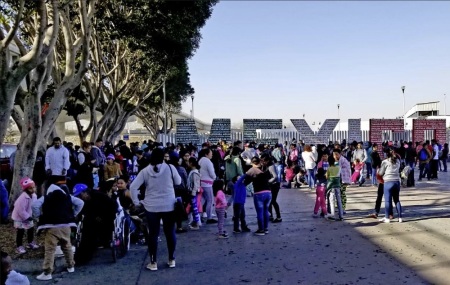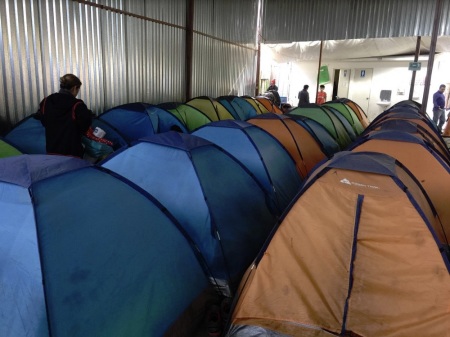How churches are helping asylum seekers on both sides of the southern border

As hundreds of thousands of migrants and asylum seekers from across the globe are seeking entry into the United States, churches on both sides of the U.S.-Mexico border are providing the much-needed assistance and hospitality to their vulnerable brothers and sisters.
Last weekend, The Justice Conference hosted a conference on migration and refugees in San Diego, California. Glen Peterson, the Southern California Office Director for evangelical refugee resettlement agency World Relief, spoke as a panelist about how churches can and are responding to the crisis.
“Churches on both sides of the border are providing shelter,” Peterson told The Christian Post in an interview.
“I met a pastor on Saturday, who as we were talking to him about the migrants and asylum seekers corrected us. He said, ‘We don't refer to them that way. We refer them to them as our guests.’
On June 1, Peterson and volunteer attorneys and paralegals who have partnered with World Relief, took a trip to Tijuana, Mexico to meet with migrants and asylum seekers there.
According to Peterson, Iglesia Cristiana Bautista Camino de Salvación in Tijuana is one church that has been at the forefront of providing for migrants and asylum seekers in the Mexican border town who have not yet approached the border to make a claim.
“They've set up rooms that would have been Sunday school rooms. But they've built bunk beds for men and another area for families,” Peterson detailed after visiting the church. “It is really cool that they're stepping up to that. They are getting donated food and supplies to help folks out there.”
Over the course of the last 11 months, the humanitarian arm of the National Association of Evangelicals has led 24 trips to the southern border and has facilitated over 250 one-on-one consultations between potential asylum seekers and U.S. immigration law professionals.
On Saturday, the legal professionals brought to Tijuana by World Relief helped educate the “guests” on U.S. asylum law and instructed them on how to elevate the relevant facts of their cases should they decide to seek asylum in the United States.
Many of them have fled their homelands in Central America, Africa, and Asia out of fear of violence and persecution or have migrated for economic reasons.
World Relief has provided presentations on immigration and asylum law in churches, at migrant shelters, at a legal clinic, and outdoors where migrants gather to learn about how the process works.
While some migrants and asylum seekers have decided that it’s best for them to make an asylum claim with the U.S. government, others have decided it is best for them to apply for a humanitarian visa in Mexico instead of risking their claim being denied by the U.S.
A rejection could result in them being sent back to their home countries after traveling thousands of miles to escape danger in those places.
Peterson also met with a number of Haitian migrants in Tijuana who have been in Mexico for over a year.
“I had the opportunity about a year ago to start meeting with some of the churches. There's a Baptist and a Nazarene and a Pentecostal church that had allowed some of the Haitian migrants to live with them in their church building and help them find jobs,” Peterson explained.
Much like Iglesia Cristiana Bautista Camino de Salvación, Peterson said that the First Baptist Church of Tijuana has set up a shelter for Haitian migrants.
“Out of that came a church plant,” Peterson stated. “So there's now a worshiping community, a congregation meeting on-site in Creole at a Mexican church. And they're also providing ongoing support. [The migrants] can go to Spanish classes, in some cases at the church.”

But on the other side of the border, an unprecedented number of asylum seekers and migrants are being detained by U.S. Border Patrol.
U.S. Customs and Border Protection informed this week that over 140,000 migrants have been apprehended at the U.S.-Mexico border in May. Meanwhile, over 11,000 people have been turned away after being deemed inadmissible.
Of the over 140,000 border apprehensions, about 84,000 came in family units and 36,000 came as single adults.
But as reports have indicated, the U.S. government is releasing many of these asylum seekers and migrants from detention. In many cases, migrants are being dropped off at local churches or nonprofit centers in southwestern states that have agreed to provide shelter.
The churches and nonprofits are scrambling to be able to provide aid to the massive influx of migrants who need temporary places to stay before they can be connected with their sponsor families in other states.
According to Peterson, a number of volunteers from churches in the U.S. that are part of World Relief’s “Good Neighbor teams” have opened their homes to asylum seekers that entered through the border.
Traditionally, the Good Neighbor Teams have provided assistance, shelter and friendship to refugees that the resettlement agency has brought over to the United States from other countries.
“We recently had 29 families who were released in the United States over a period of six weeks,” Peterson said. “All of those people were at least temporarily given host-home support through one of our Good Neighbor teams.”
Along with the rise in the total number of people arriving at the border, there has been a drastic increase in African migrants who have come up through Central America.
Over the past week, more than 500 African migrants have reportedly been detained by border patrol agents in Texas alone. Many are fleeing violence in nations like Nigeria, Cameroon and the Democratic Republic of Congo.
Efi Tembon, a Cameroonian who works for Wycliffe Associates and runs the aid organization Oasis Network for Community Transformation, told CP that he has heard that as many as 2,000 Cameroonians are in Mexico as thousands have fled the country in recent years since military violence against separatists has greatly impacted and even destroyed civilian communities.
“There are many more coming,” he said. “I spoke with a guy in Ghana. He told me he was part of a group of 25 that was getting ready to come. There are hundreds more.”
He explained that many of the African migrants and asylum seekers have saved up to buy plane tickets to Central or South America. Once there, they then transport through Central America in hopes of reaching the U.S.
“It is easier for them to apply for asylum while in the U.S.,” he explained. “I met a Somalian guy who made into the U.S. who came through Mexico,”
Mike Smith, a Methodist pastor who runs a migrant shelter in Laredo, Texas, told USA Today this week that about 1,500 Central and West Africans are waiting across the border in Nuevo Laredo, Mexico in search of asylum. But those migrants must wait for the Customs and Border Protection to process their case.
Smith stressed that the Central African migrants are unlike the Central American migrants that come to the U.S. in the fact that most of them don’t usually have a contact waiting to sponsor them. While Central Americans are staying in his shelter for a few days, Smith said African migrants can be there for a week or more.
“They’re getting the worst end of the stick,” Smith explained.
With such an influx in migrants and asylum seekers in border states, some asylum seekers who have been released from border detention in Texas and New Mexico are being bused to places like Colorado to relieve overcrowding in certain shelters.
In May, it was reported that three churches in Denver have opened their doors to provide shelter to asylum seekers.
“What we are doing is we are helping them connect to their family and their friends and their support networks here,” Pastor Michael Hidalgo from Denver Community Church told CBS Denver.
“We do everything in our power to reflect and put hands and feet on the love, mercy and compassion of God that informs our faith as a church,” he added. “And so whatever that means for us in our world or city or country, we believe that’s our first response and really our only response.”
In Arizona, Deseret News reported on an unofficial coalition of churches that works with the federal government to find places for asylum seekers to go after they are released. The news outlet noted in February that buses full of migrants and asylum seekers arrived almost daily at churches in Pheonix.
“Where there’s not enough resources or enough people or enough volunteers or enough government employees to help, it’s always been the faith-based community that typically not only provides backup but actually demonstrates leadership,” Arizona Gov. Doug Ducey told Deseret News at the time. “It has been these sanctuaries where people can find shelter and food assistance to follow the gospel message of Matthew 25 to help the least of us.”
Follow Samuel Smith on Twitter: @IamSamSmith
or Facebook: SamuelSmithCP






















